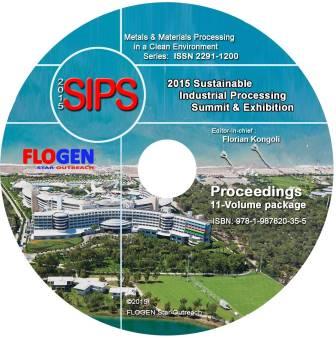2015-Sustainable Industrial Processing Summit
SIPS 2015 Volume 8: Composite & Ceramic, Quasi-crystals and Nanomaterials
| Editors: | Kongoli F, Pech-Canul M, Kalemtas A, Werheit H |
| Publisher: | Flogen Star OUTREACH |
| Publication Year: | 2015 |
| Pages: | 300 pages |
| ISBN: | 978-1-987820-31-7 |
| ISSN: | 2291-1227 (Metals and Materials Processing in a Clean Environment Series) |

< CD shopping page
Fabrication of Nanocrystalline Boron Carbide Powder
Marina Antadze1; Tamazi Batsikadze1; Aleksandre Kandelaki1; Ramaz Kharati1; Boris Margiev1; Archil Mikeladze1; Otari Tsagareishvili1;1FERDINAND TAVADZE INSTITUTE OF METALLURGY AND MATERIALS SCIENCE, Tbilisi, Georgia;
Type of Paper: Regular
Id Paper: 148
Topic: 18
Abstract:
Unique physicomechanical properties of boron carbide provided efficient application of this material to the different areas of contemporary mechanical engineering, nuclear energy, precise machinery, etc. However, toughness and low crack resistance of the boron carbide product make obstacles to its widespread application. Resources of further improvement of the properties of this material by traditional methods have practically been expired. A way toward solving these problems is creating nano-sized systems where particle size is less than 50-100 nm. Nano-sized particles qualitatively differ from those of micron size. This difference is provided by drastic impact of the increasing surface layer on a free energetic balance of the system. Such systems reveal new opportunities for improving physical, mechanical, tribotechnical and other properties.
The present paper deals with the development of a technology for producing boron carbide powder in nano-crystalline state. The technology provides the powder fabrication via interaction of different types of organic compounds and boric acid at relatively low temperatures (1200 - 13000C). The materials selection for the synthesis of boron-containing polymer precursors is performed basing on the following polymers: polyvinyl alcohol, phenol formaldehyde resins, citric acid, sucrose, etc. The prepared precursor is subjected to pyrolysis in inert or hydrogen atmosphere at 600-10000C with subsequent thermal treatment at 1200 - 13000C in a regulated temperature mode. XRD, SEM, etc. analyses show that the resulting product is nano-crystalline boron carbide powder.